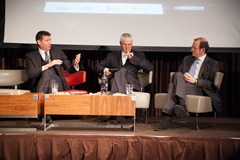The last twelve months has seen the economy slowly, if not surely, start to go in the right direction; business confidence returning; our mainstream national politicians continue to struggle to win back the trust and credibility of the voting public; Scotland remaining as part of the Union, but nationalists still pushing for separation; and on the back of that Scottish referendum a significant move towards devolution for England’s city regions.
Downtown celebrated its tenth anniversary and as ‘metro mayors’ and devolution has been an issue we have advocated for many a year, it was with some satisfaction that our decade in business coincided with this agenda being genuinely discussed and debated by political leaders from all parties.
Manchester has, once again, stolen a march on the rest of the North, with its ‘Devo Manc’ deal, but there is no reason why Liverpool can’t get its act together in the New Year and begin to map out a new governance structure for the city region that will give us the new powers and additional resources that would surely be welcomed by even the most parochial of local politicians….or will they?
The one negative in a year of many positives for Liverpool this year has been the sad and untimely reminder that at a senior political level we remain disconnected and poorly co-ordinated despite the fact that all six local authorities are Labour controlled.
From the debacle over what to call the newly formed Combined Authority through to the decision to have not one but two campaigns operating to try and secure high speed rail to the city, our civic leaders have demonstrated a unique ability to shoot themselves – and our city region in the process – not so much in the foot but through the head.
On the back of much heralded events such as the Global Enterprise Congress and the International Festival for Business, not forgetting the ‘Giants’, Liverpool is in a fantastic place to continue the momentum it has developed since hosting the European Capital of Culture in 2008.
A wonderful retail, leisure and hospitality offer, a regenerated city centre, a BID company that is starting to make a lot of sense, an Arena that will soon be complimented by a conference centre and the most spectacular of waterfronts are the ingredients that help make a great city.
Through its Linking Liverpool campaign Mersey Travel have proved that we really are ‘better together’, and the Local Enterprise Partnership have been doing some good, ‘joined up’ things under the radar too. But such projects are the exception rather than the rule, and for the private sector it is all getting a little tiresome. News that the Marketing function that has been managed at a city region level is to possibly be broken up again simply adds to the frustration.
In 2015 I would plead with the political leaders of all six councils to demonstrate some maturity and Leadership and take advantage of the wonderful landscape that has been created during the past ten years. It is, quite literally, all to play for with a more buoyant, confident business community, Westminster politicians wanting to devolve more powers to the city region, and Liverpool able to boast being the best visited city in the UK outside of London and Edinburgh, and preparing to host IFB 16.
But, as we have learned to our cost over many years now, there is every possibility that Liverpool will look the gift horse in the mouth, and miss a once in a lifetime opportunity to secure its place as a central player in the new Northern Powerhouse that is being established, instead simply be an envious observer.
At the Liverpool city level I am optimistic that there will be more positives than negatives in the New Year, with another visit scheduled for MIPIM, the Liverpool in London project continuing to grow, and the city, ironically given our more local difficulties, forging closer links with Manchester for the common good.
Nonetheless, the cuts agenda that has to be implemented will have a huge impact; the thorny issue of business support is still to be sorted; and I have an increasing fear that the once private sector led, independent Liverpool Vision will find itself being consumed into and by the council, thus losing the energy, innovation and entrepreneurial spirit that has made it such a successful organisation since the mid 1990’s. It may not get everything right, but Vision is still seen by business leaders as THE business- friendly arm of the burgeoning public sector, and to diminish its ability to engage in similar fashion in the future would be a big mistake.
I have heard it said that Visions move into shared space with the council will result in local government staff leaning a different culture that will enhance performance. I am not convinced that the reality won’t be Vision staff having the life sucked out of them. I hope I am wrong.
Whatever, the glass is most certainly half full. In 2015 Downtown will continue to discuss and debate these issues and more besides I’m sure. We will ruffle a few feathers, no doubt fall out with one or two people – but we will remain a force for good.
We are passionate about this city. We are passionate about the North of England. It is why we do what we do, making this the best business club in the city, the most relevant, the best connected and never afraid to speak our mind.
Have a fantastic Christmas, a prosperous New Year, and don’t do anything I wouldn’t do!







